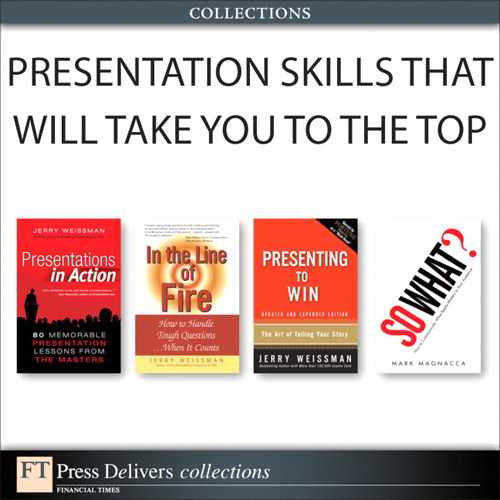69. Tell Me the Time, Not How to Build a Clock: Keep Your Answers Short
“Brevity is the soul of wit,” said Polonius, the sage royal advisor in Hamlet, in response to the king’s request for his opinion. William Shakespeare had his seventeenth-century character use wit to mean intelligence instead of its current usage to mean clever humor. But just as the definition of wit has shifted over time, so has the definition of brevity. Far too many presentations—and even more conversations—go on and on and on, warranting the impatient accusation, “Tell me the time, not how to build a clock!”
We have become accustomed to politicians who go into windbag mode at the drop of a hat. The most egregious example is in televised congressional hearings, where even the questions posed by senators or representatives are interminable. Over time, we have become reluctantly tolerant of verbosity in politics, but we never cut anyone such slack in business.
In presentations, nowhere is verbosity more frequently perpetrated than in answers to questions. All too often, presenters introduce new material in their answers or rehash their original material ad nauseam. They fail to understand that the primary purpose of opening the floor to questions is to clarify the content in the presentation. Audiences are less interested in comprehensive and exhaustive responses to their questions than they are in seeing how a presenter handles him- or herself in the line of fire.
The best expression of this view comes from David Bellet, the founder of Crown Advisors International, one of Wall Street’s most successful investment firms. David, who was an early backer of Hewlett-Packard, Sony, and Intel, is retired now, but whenever he considered an investment, he often made challenging questions a standard part of his due diligence.
When I ask questions, I don’t really have to have the full answer because I can’t know the subject as well as the presenter. What I look for is whether the presenter has thought about the question, been candid, thorough, and direct; and how the presenter handles himself or herself under stress.F69.1
Follow David Bellet’s advice: Make your answers to your audience’s questions brief. When someone asks you the time, just tell them the time. Make your presentations brief, too. And while you’re at it, make your conversations brief. Conversation is a form of communication, only less formal than presentations. The social windbag is as much of—if not more than—a bore as the political windbag. We can always change the channel on the politician; escaping the conversational chatterbox is more difficult.
Be succinct in your presentations and conversations, and leave the clock making to Timex.
